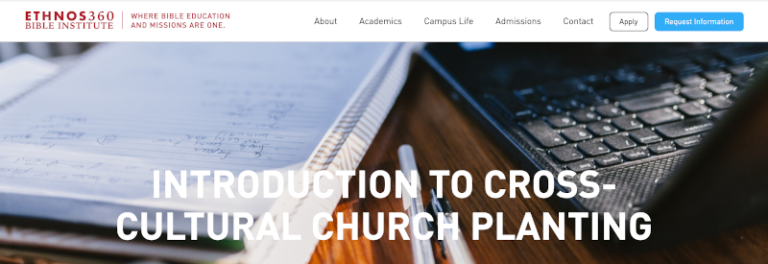
“Church Planting” means different things to different people. Defining terms becomes necessary when meanings abound. For some, church planting can mean:
- Construction of a new building for community meetings.
- Establishing “our” brand somewhere else.
- Passing out tracts in a new location.
- Organizing a group of Christians for a style of regular gathering.
- Gathering people in a geographical area to become disciple-making Christ-followers.
What We Mean
When we say “church planting” we mean that we are going to people who have no knowledge of God, who have no access to a way to learn about Him, to teach them and leave behind a maturing group of Christ-followers, led by qualified church leaders from among them, who are, by faith, doing for other people what we did for them. (Going to every ethnic group to preach, baptize, and teach people to obey all that Christ commanded us.)
“What is cross-cultural church planting?” will be answered here from a perspective of church planting across barriers of very different languages and cultures. It will be introductory and incomplete at best. (About differing cultures, see E-3, P-3, Winter-Koch.)
“Cross-cultural” means working across boundaries of very different cultures between the two parties or between the teacher and the learner. People in both cultures must become learners to communicate effectively, coming to the same thinking about a particular subject.
On this page “Church” means people rather than buildings.
“Church planting” in this context includes the concept of working ourselves out of a job by establishing a gathering of people who believe the Bible, who follow Christ in obedience and are able to equip others to believe and obey God.
Furthermore, on this page, my particular focus on cross-cultural church-planting is toward communicating with the “least-reached“; those groups of people who have not had access to a Bible or a Christian or a witness of the Good News in a language they understand.
The objective of missions, of cross-cultural church planting, is to establish believers, to equip them with the tools and mindset to equip others so as to be able to work themselves out of a church-planting job or ministry by means of discipleship. We are working to establish such Christ-followers among language groups of people who have not yet been told what Christ did for them and walk with them until they are able to tell and equip others.
We want to establish a group of disciple-making disciples who follow Jesus, who have high regard for His written Word, who know His identity, who know Him, who know their own identity in Christ, who engage in obedient loving relationships, and who are active in the lives of people both inside and outside of their group to empower them to follow Jesus with confidence in Him.
WILD
The primary objective of church planting is establishing thriving churches that glorify God. A thriving church, a maturing church, is WILD*: (Word. Identity. Life. Discipleship.) You will need to see the link below for a better explanation, but here’s my rough summation.
- Word. A maturing church will have high regard for, and practical use of, God’s written word in their daily lives. The Word is presented in such a way as to allows it to enter and engage hearts at a worldview level. The Word gives the Spirit opportunity to “prepare the soil” by challenging fundamental assumptions, commitments, and alignments. Other aspects to consider include the level of authority the church ascribes to God’s Word, the way the church endeavors to interpret God’s Word, and the capacity of the church to make use of God’s Word.
- Identity. A thriving church will have a maturing Biblical understanding of the identity and character of the God of the Bible, the identity and work of Jesus Christ, the identity of the universal Church as the bride of Christ, their individual identity in Christ as part of His body, their position in Christ, and their role as His ambassadors.
- Life. Some considerations in assessing the growing maturity of a church are the nature and quality of its spiritual life, its awareness of the overall purpose for its existence, specific functions the church takes on, the way it goes about establishing forms for itself, and the fruit that results from the life of the church. Believers will be actively engaging with God’s word in the way that they live their personal lives, interact with the local church, represent Christ to their community, and engage believers in other congregations.
- Discipleship. Perhaps relational discipleship. The church will be growing in its relationship to Christ, its ability to make personal practical applications of truth, its value given to purposeful relationships that draw people to Christ, its encouragement of members to exercise their gifts, and its strategies for equipping people for outreach.
“[The WILD] framework is designed to help us consider, evaluate, discuss and determine objectives for our work, but we make no claim that Scripture arranges itself according to these four categories. … Our goal then is simply to use helpful, legitimate categories to bundle together threads which, in their actual setting, are blended by God into a wonderfully rich and diverse tapestry. See more about WILD from AccessTruth.com.
Reachable?
So you have a group of people who know nothing about the God of the Bible, have an unwritten language, no scriptures, no believers, and a mysterious culture that twists everything you communicate; where do you start? What do you do that leads to a church that functions without you?
Are these things achievable? Is there a way that a church planter can intentionally and strategically teach and disciple people to the point where the planter’s presence is no longer needed among them? See the Yembiyembi video to follow a missionary from start to finish. (Yembiyembi: Unto the Nations – 30 Minutes)
Thriving?
Establishing thriving churches requires that individuals in the discipled congregation have the ability to feed themselves from God’s written word in a language they readily understand. Self-feeding is an essential part of spiritual growth. Ready access to the word of God is essential for that self-feeding and is the means by which the Holy Spirit normally guides believers.
For the cross-cultural church planter, establishing a thriving, Christ-centered church that endures and reproduces for generations will require several things:
- Being There: Developing relationships of trust that permit learning and, later, teaching.
- Language: Language is the expression of culture. Acquisition of the unwritten language to a very high level of fluency so as to enable clear communication, creation of an alphabet and writing.
- Culture: Culture includes the ideas and assumptions about reality that are expressed in words or behavior that are driven by beliefs or worldview. A deep understanding of the meaning behind the words and sentences used by the engaged people group requires knowledge of the culture behind the ideas.
- Translate: Translating God’s Word into the heart language so that God’s message can be faithfully communicated.
- Literacy: Establishing sustainable literacy programs (teaching people to read) is necessary so that the authority for faith is based on what God has spoken and written rather than the authority of the messenger. Authority based on the messenger departs with the messenger.
- Discipleship: In the context of personal relationships, Bible teaching that follows Biblical patterns for a progressive revelation of God’s identity, character, and attributes, leading to a change of thinking that results in godly behavior.
- Teaching: God gave progressive revelation of Himself to people over time. Following His progress teaching pattern to communicate key themes about God’s identity, character, purpose, and plan are necessary for the maturity and endurance of the local church.
- Equipping: Guidance and oversight are key components of modeling and establishing servant leaders who are capable and qualified to lead the church and teach others to lead.
Team Work
Most of the unreached ethnolinguistic people groups live in geographically difficult places, so a huge part of church planting involves providing logistics and infrastructure to support the people who are doing the church planting.
In church planting what is your strategy for passing on the work to the new believers and leaders in the church? – https://accesstruth.com/lftf-episode-29

Training for church planting – https://vimeo.com/363614698
Becoming aware of the unreached? Lean into your local church …
The objective …
Bring a church group to Wayumi for an intensive introduction to cross-cultural church planting.

If you were to be a cross-cultural church planter, a career missionary, what would that look like? See Yembiyembi – https://vimeo.com/88474022
Share This Post
More To Explore

The Bible Basis for Raising Missionary Support
The Bible Basis for Raising Missionary Support Many people are afraid to obey God to do missionary work because their culture has told them that
Vision
What is the worldwide vision and mission of the local church? Glorify the Father in Completing the Great Commission Where are we going?Are we there

